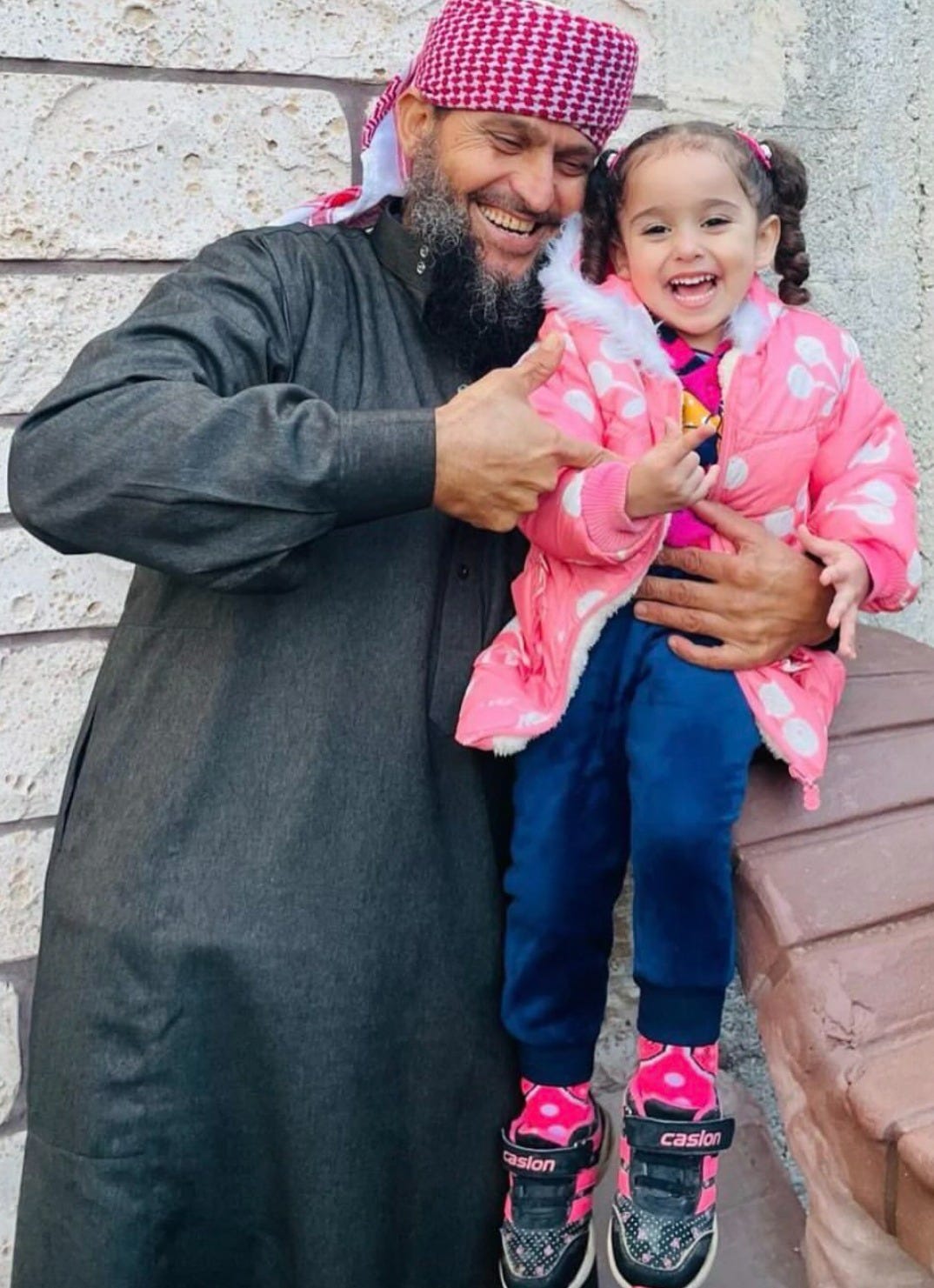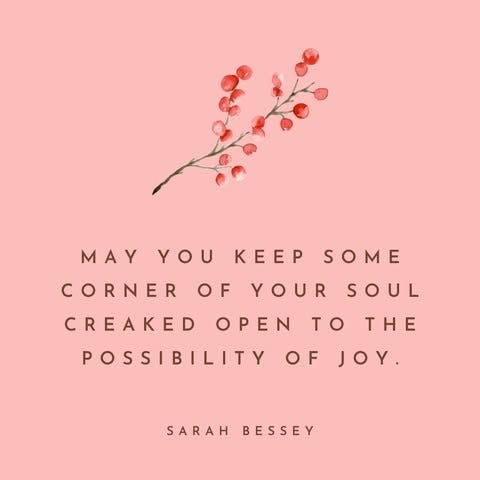When I see him in my mind’s eye, he is beaming as he holds his granddaughter tightly, tugging at her pigtails while she pulls at his beard.
In another mental picture, he is grinning from ear to ear as he presents an elderly lady with a red rose.
In still another, he is summoning dozens of stray cats to dine by clinking a can of food against the ground, again with that same warmth.
In yet another, he helps a group of children send kites soaring.
There are so many joyful images of this man.
Yet the first video most of us ever saw of Khaled Nabhan was a profoundly grievous one, just over a year ago. In it, he tenderly holds his three-year-old granddaughter Reem’s lifeless body, killed by an Israeli air strike. He caresses her face and kisses her, willing her to wake up.
The Soul of my Soul, he intones.
For over a year, Nabhan awoke daily with tears in his eyes, remembering his two grandchildren killed in the Gaza genocide — Reem and her brother Tareq. Then he set about his day, letting love pour forth from a heart broken open by grief. Somehow, he did so with the most irrepressible joy. Always with that wide and winning smile.
Khaled Nabhan, the Soul of Our Souls, was martyred on Monday, killed by Israeli tank fire.
Like so many millions around the world, I am brokenhearted.
My tears keep finding me, during this third week of Advent, which is focused on Joy. This theme feels strange, almost invasive, amidst my grief. I feel angry, despairing, sickened.
I do not feel joyful.
Yet I cannot stop thinking about Nabhan — or Abu (Father) Diaa, as he was affectionately known. I cannot stop thinking of his joy. So I have been pondering the quality of soul that can hold so much grief and so much joy together. I have been wondering about the practices that keep joy alive amidst suffering.
Sarah Bessey wrote this week of keeping a corner of your soul “creaked open to the possibility of joy.” For some of us this requires considerable effort. In Abu Diaa’s case, it is as though grief violently busted the door open and the beloved grandfather simply took the door off the hinges and threw the whole thing away. With expansiveness of spirit, he let grief and joy flow freely from his being, co-mingled.
"The light shines in the darkness but the darkness has not understood it,” says the Gospel writer. I do not claim to understand the pure-heartedness of those who cannot help but let their light shine so fully, so freely, in a world full of oppressive forces that are threatened by their radiance. To bring your full self into the world, with all the vulnerability that requires, is a difficult task in any context. It becomes existentially demanding when luminous souls are being intentionally targeted and exterminated.
It has been my experience that there are some people whose experience of God has been so direct, so immediate, that this singularity of being is the only way they can move through the world. They go through life without the slightest pretense. Their love is freely expressed in the most profound grief and the most ecstatic joy.
Any of us would be fortunate to embody just a fraction of this wholeness, this integration, this love.
My friend Muhammad messages me from Gaza:
"I swear that we are living in the worst days in the world. We cannot do anything. We get everything with great difficulty. Notice that we get bread every 13 days, 20 loaves. This is crazy, not to mention the rest of life. How difficult it is. Praise be to God. I do not know what to say except praise be to God."
Praise. Praise? Praise! How?! With death machines constantly droning overhead, with famine and thirst as ever-present harbingers, from within the thin walls of a tent in winter, how does one praise?
I will not superimpose my Christian theology on my Muslim brother, so I will not attempt to speak to how praise is possible for Muhammad. I am in awe of his faith, and am hard-pressed to imagine myself responding to these horrors with the strength of spirit that he has. I have to wonder at what praise means for me, as I watch this catastrophe unfold from afar.
Advent anticipates the coming of Emmanuel: God-with-us. It invites preparation for the presence of the Divine who is vulnerable to violence of every kind, from womb to tomb. There is no place where the Holy does not dwell: “God is under the rubble,” as Palestinian Lutheran pastor Munther Isaac says. Perhaps praise most authentically flows from remembering God’s intimate presence with us in the pit of our pain. Perhaps joy rises up most naturally as we practice loving one another amidst our grief, as God is with us.
Praise be to the God who does not leave us to suffer alone.
Black mystic and spiritual teacher the Rev. Dr. Howard Thurman1 was intimately familiar with the depths of grief and heights of joy, writing about both, often simultaneously. He wrote:
I will light candles this Christmas. Candles of joy, despite all the sadness. Candles of hope where despair keeps watch. Candles of courage where fear is ever present. Candles of peace for tempest-tossed days. Candles of grace to ease heavy burdens. Candles of love to inspire all of my living.
Authentic joy shines across the generations, particularly in places of great suffering, radiating from those who keep the door of their heart open amidst ongoing oppression, trauma and loss.
It is the joy of the now-martyred grandfather in Gaza, giving of himself with generosity, kindness and compassion.
It is the joy of enslaved Africans singing freedom songs, just out of earshot, in plantation hush harbors.
It is the joy of a father meeting his newborn child, while bidding farewell to his wife who died in childbirth.
It is the joy of Latine folks gathering to lovingly honor and celebrate La Virgen de Guadalupe in the face of ongoing and escalating crackdowns on immigrant communities.
This joy is daily bread – baked in praise, consumed in the company of other needy people. It is fuel for moving through life with all its inhumanities, nourishing the spirits of those who have been dehumanized.
I do not wish a door-busting grief upon anyone. But given that griefs will inevitably show up on our spiritual doorstep, I only hope that somehow, someday, in even some small way, you would know the griefs of your life as predecessors of joy. My prayer for myself — and for you if you would like it — is that, as Rumi says, we might receive these human experiences, “as an unexpected visitor”:
Welcome and entertain them all! Even if they're a crowd of sorrows, who violently sweep your house empty of its furniture, still treat each guest honorably. He may be clearing you out for some new delight.
It is often said that grief is love with no where to go. Perhaps there is joy to be found in loosing our control of love’s destination, allowing our love to flow prodigally — never reaching its desired recipient, yet touching many hearts in its return to Source. Even here, in the depths of despair, love flows toward the One who is present in all things, carrying us, together, toward “Ocean depths of happy rest.”
Indeed, somewhere, beyond this veil of grief, I can see them:
Abu Diaa and his beloved Reem,
dancing together
in joy.
If you want a tangible way to come alongside a family in their grief, please consider a gift to the Al-Naami family. I have been fundraising for Muhammad, Maryam, toddler Khaled and a baby on the way for several months. In the process, I have gotten to know their beautiful, breaking hearts. My heart has been broken, and grief has poured out, even as have been filled to overflowing at the joy at knowing this precious family. It would mean the world to me if you would support them with a donation.
Considered one of the spiritual elders of the Civil Rights movement, Thurman’s book, Jesus and the Disinherited, was carried by the Rev. Dr. Martin Luther King, Jr. everywhere he went.








Lauren, this brought tears to my eyes. Thank you for writing so beautifully about Khaled and his family, and these heart wrenching times.